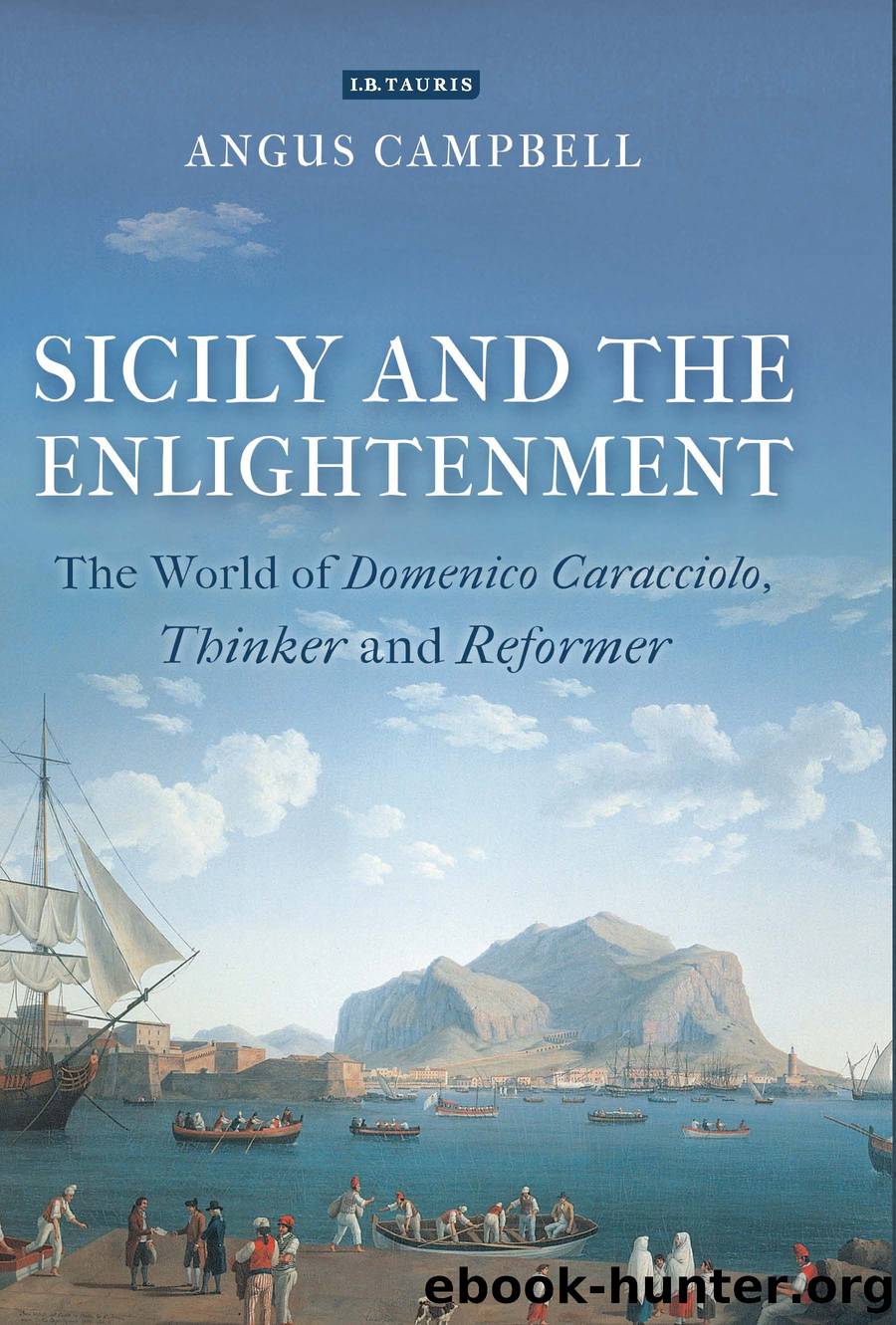Sicily and the Enlightenment by Campbell Angus;

Author:Campbell, Angus;
Language: eng
Format: epub
Tags: Biography
Social and cultural history
Early modern history
modern history to 20th century
Political science and theory
Diplomacy
Sicily
Italy
Publisher: I. B. Tauris & Company, Limited
Published: 2016-11-09T16:00:00+00:00
9
Clearing the Decks
â¢
By far the greatest battle of Caraccioloâs viceregency was the one he engaged in to establish a just method of assessing and collecting taxes in Sicily. He fought with all his strength, against fierce opposition from the barons and a lack of the kingâs backing, to carry out a land survey, a catasto, so that the assessment could be based on reality. This was an idea that he brought with him to the island â we have already seen that he was urging the Piedmontese catastal system on Tanucci as well as Maria Theresaâs catasto in Milan from the time he went to Turin, and the basic idea can be traced back to the teachings of his old master Genovesi.1
In Sicily he began the long and arduous process later on in 1782 when the General Parlamento met in April, but the struggle with the Sicilian Parlamento, the barons, all the vested interests and, in the last analysis, the Bourbon monarchy itself was a very long affair that lasted beyond his tenure of office. Meanwhile, before, during and after this struggle, which was by far the closest to his heart, there was a whole series of other reforms to be dealt with, all of them concerned with social justice, as Caracciolo saw it â lowering the haughty, raising the downtrodden, ironing out twisted legislation and cleaning up corroded administration.
One of his earliest acts on arrival heralded his attentions as far as previous administrations were concerned. On 23 February 1781 he issued an injunction to the Protonotary to the effect that for the election of every sort of official in the future there should be a choice of three candidate names instead of the usual solitary one for the nomination and election of any vacancy.2 This struck a sharp blow in favour of widening the choice of officials, selecting perhaps the better man and limiting the facility of the powerful to place their people willy-nilly where they wished, a facility that had remained undisturbed for time immemorial. On 4 June 1782 he felt he had to remind the members of the senate of Palermo and its subsidiary officers that they did not hold their positions for life, but only pro tempore.3 Caracciolo also publicly reprimanded the advocate fiscal of the Gran Corte for issuing a two-month safe conduct to a military gentleman, requiring him to submit a written justification,4 and re-affirmed in a minute to Acton on 11 July 1783 that no tribunal, magistrate, court or minister could use the kingâs name without the viceroyâs permission.5
These might seem paltry matters, but they were not at all: the clarification to the senate and the reprimand to the judge were of consequence to the society of the time and it was necessary that the government of Naples was behind Caracciolo in what he was doing. His correspondence with Acton in August and September 1783 was much taken up with the case of a certain Dolce, a public official who had defaulted
Download
This site does not store any files on its server. We only index and link to content provided by other sites. Please contact the content providers to delete copyright contents if any and email us, we'll remove relevant links or contents immediately.
| Africa | Americas |
| Arctic & Antarctica | Asia |
| Australia & Oceania | Europe |
| Middle East | Russia |
| United States | World |
| Ancient Civilizations | Military |
| Historical Study & Educational Resources |
Magic and Divination in Early Islam by Emilie Savage-Smith;(1197)
Ambition and Desire: The Dangerous Life of Josephine Bonaparte by Kate Williams(1087)
Operation Vengeance: The Astonishing Aerial Ambush That Changed World War II by Dan Hampton(986)
What Really Happened: The Death of Hitler by Robert J. Hutchinson(871)
London in the Twentieth Century by Jerry White(848)
Time of the Magicians by Wolfram Eilenberger(844)
Twilight of the Gods by Ian W. Toll(813)
The Japanese by Christopher Harding(803)
Papillon by Henry Charrière(796)
Lenin: A Biography by Robert Service(780)
The Devil You Know by Charles M. Blow(779)
Twelve Caesars by Mary Beard(769)
Freemasons for Dummies by Hodapp Christopher;(749)
The Churchill Complex by Ian Buruma(731)
Napolean Hill Collection by Napoleon Hill(706)
The Enlightenment by Ritchie Robertson(693)
Henry III by David Carpenter;(690)
Bohemians, Bootleggers, Flappers, and Swells: The Best of Early Vanity Fair by Bohemians Bootleggers Flappers & Swells- The Best of Early Vanity Fair (epub)(688)
The Rise and Triumph of the Modern Self by Unknown(659)
